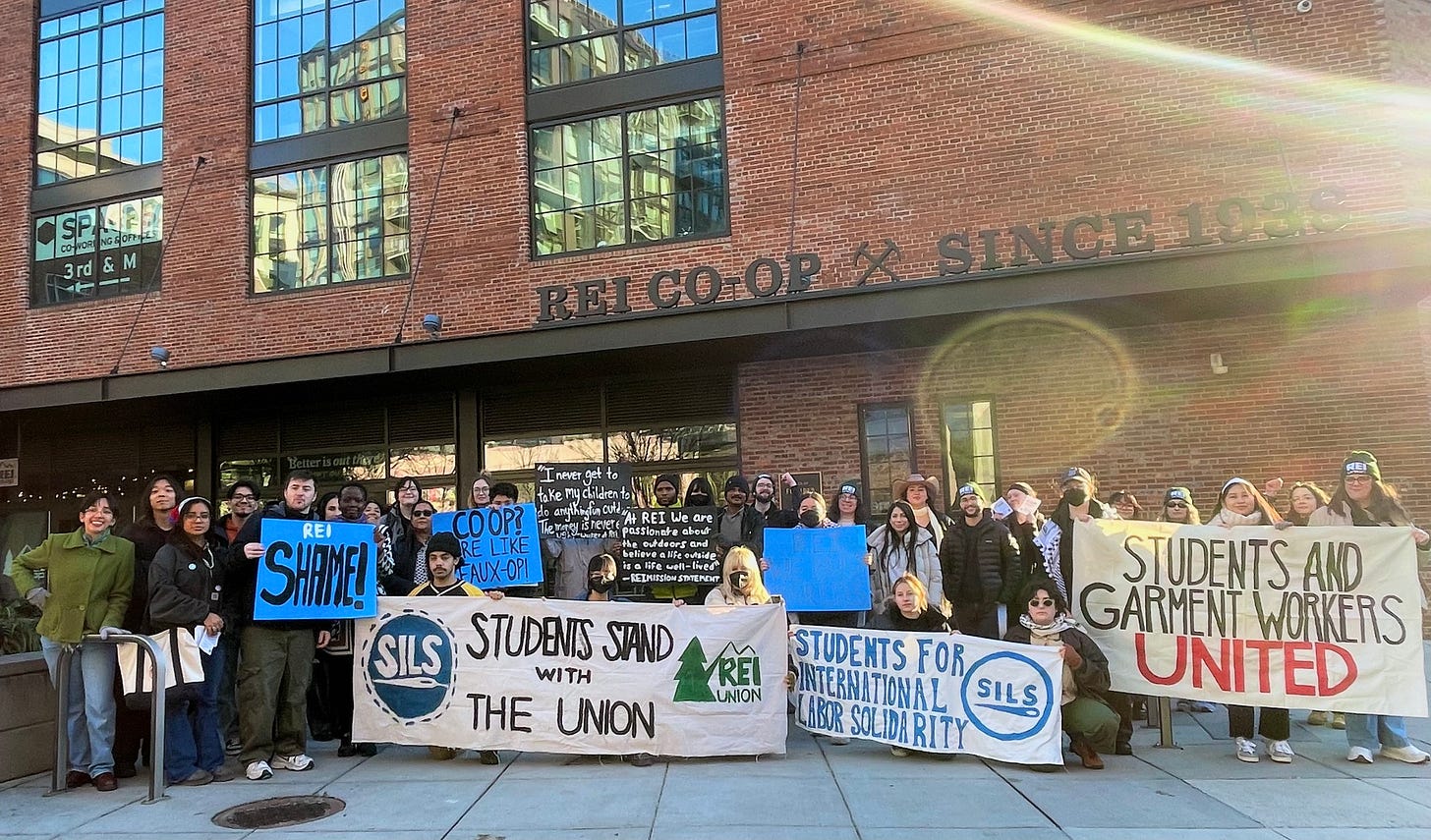Beneath REI’s Green Sheen
Episode 24: A recent report reveals the human cost of global supply chains
Globalization has set the stage for complex supply chains that allow multinational corporations to geographically and legally distance themselves from the exploitative labor conditions they often incentivize and perpetuate—shielding themselves from accountability while profiting from systemic human rights abuses. Companies such as REI have long cultivated an image of sustainability and progressive values, but how do those commitments hold up when you follow the supply chain?
In Episode 24 of Art of Citizenry Podcast, I am joined by Clare Hammonds of the UMass Amherst Labor Center and Katie Nguyen of Students for International Labor Solidarity, co-authors of Beneath REI’s Green Sheen, a report that investigates human rights violations in REI’s global production network. From union-busting and debt bondage to sourcing partnerships with corporations known for environmental destruction, their research reveals a pattern of practices that put supply chain workers at high risk of exposure to egregious labor rights abuses with no reliable avenue for recourse or remedy.
Earlier on the podcast (Episode 22), we talked about union busting within REI’s retail stores, and contextualized it within the larger effort being taken by union busting companies to have the entire National Labor Relations Board declared unconstitutional. In my research for that episode, I came across Clare and Katie’s report. It was a pleasure to speak with them to better learn about their findings will diving deeper into ways we can build more power.
REI maintains a carefully curated image of upholding a corporate commitment to human rights, social responsibility, and environmental protection. In analyzing REI’s sustainability claims, we found a significant disconnect with the reported labor violations at its supplier factories. This research underscores the need for heightened scrutiny of REI’s supply chain and accountability for REI in meeting its labor commitments.
- Clare Hammonds, University of Massachusetts Amherst Labor Center
In this episode, we unpack the systemic issues that enable these violations, the limits of corporate impact reports, and the role of worker-driven social responsibility initiatives and student movements in supply chain accountability.
What happens when a brand’s values become a marketing tool rather than a moral compass? And how can we collectively hold companies accountable when harm is buried deep in the supply chain? Tune in for a conversation that unpacks the realities of complex supply chains—and uplifts the people building power to confront it.
The brands are responsible for the conditions in their supply chains—no matter how many layers of subcontracting they hide behind.
- Katie Nguyen, Students for International Labor Solidarity (SILS)
About the Report
"Beneath REI's Green Sheen" is a new report from the University of Massachusetts Labor Center and Students for International Labor Solidarity, exposing the severe labor abuses hidden within REI’s global supply chain. The expansive evidence of abuse reveals a stark contrast between the company’s ethical branding and the reality faced by the workers who produce REI-branded clothing. From forced labor and poverty wages to union-busting and discrimination, the findings reveal systemic violations across REI’s supplier factories.
In a world where rising authoritarianism, state violence, and unbridled corporate interest are increasingly taking hold, building international labor solidarity and organizing power have never been more urgent. As SILS, we are staunchly committed to building and training up an effective powerful student movement, fighting for worker power and justice.
- Katie Nguyen, Students for International Labor Solidarity (SILS)
I support my mother and my daughter on my salary. I do as much overtime as I can because I can’t live on my regular wage. We try to limit our food as much as possible so that we can try to pay for my mother’s medical treatments.
- 39-year-old woman who works at a factory producing garments for REI
Thinking Within the Context of Recent Tariff Hikes
According to the report, “REI primarily sources from countries where human rights and labor rights violations are rampant, where workers are paid unlivable wages, and where there is a shrinking civil society space.”
Countries in Southeast Asia such as Vietnam and Cambodia, both countries where REI sources goods from, have been hit hard by the tariff hikes. These countries face high U.S. trade deficits precisely because U.S. corporations have outsourced production there to take advantage of weak labor standards and extremely low wages. Independent unions are illegal in Vietnam and labor repression in Cambodia is extreme – these are conditions created to attract corporations, a system fueled by global economic inequalities. The race to the bottom is not new and it continues to mean transparency and due diligence are secondary priorities, further obscuring human rights violations.
Worker-Driven Social Responsibility
WSR is a model of labor rights protection in which workers lead the design and enforcement of programs that directly impact their working conditions. At its core are six principles that prioritize worker agency, binding commitments from brands, and independent oversight.
WSR represents a shift in the way labor rights and corporate accountability are pursued in global supply chains. Unlike multi-stakeholder initiatives, which often rely on voluntary commitments and place corporations, investors, and NGOs at the decision-making center, WSR initiatives prioritize the leadership and lived experience of workers themselves. This grounding in worker agency ensures that the rights and protections being negotiated are not abstract principles but responses to concrete, on-the-ground realities. Worker-driven social responsibility initiatives reflect a more equitable form of social responsibility by correcting the inherent power imbalances between corporations and workers.
Any accountability program that relies solely on corporate self-reporting will always be limited. True accountability requires workers involved in enforcement and consequences for factories that fail to meet standards.
- Clare Hammonds, University of Massachusetts Amherst Labor Center
Meet Our Guests
Clare Hammonds is a Professor of Practice at the UMass Amherst Labor Center, where she leads research and training initiatives to advance worker justice and collective bargaining rights. An expert in workplace and labor issues, she is trained in both qualitative and quantitative research methods, with her work published in scholarly journals such as Social Problems and the Labor Studies Journal, as well as in news outlets like The Boston Globe. She is also a co-editor of Labor in the Time of Trump (Cornell University Press, 2020) and frequently provides commentary on labor rights and organizing for local and national media.
📌 The UMass Amherst Labor Center is the premier Labor Studies degree program in the US, offering three Master’s degree programs as well as undergraduate curriculum, research, and outreach with labor and community organizations. With over 1,000 alumni, Labor Center graduates are leaders in the labor movement and workers’ rights issues across the world.
Katie Nguyen is the National Organizer of Students for International Labor Solidarity (SILS). She is based in New York City. She started organizing around the abusive criminal legal system and policing in her hometown, St. Louis, TX, and later, was a student organizer in Houston, TX, organizing around housing justice and resisting gentrification.
📌 Students for International Labor Solidarity (SILS) is a student- and garment worker union-led organization, mobilizing students across the US to organize in solidarity with the workers who produce their collegiate apparel. SILS is based on the simple principle: When university students stand with garment workers’ unions around the world, we can win. We organize to hold universities accountable for their commitments to labor rights. Universities’ contracts with apparel brands offer us a unique point of leverage as students to hold brands accountable for the consequences of their purchasing practices. Together, we are building on the legacy of students organizing with garment workers to win dignified work and corporate accountability in global supply chains.
If you haven’t already, be sure to tune into our episode on union busting in REI’s retail stores —
Support the Podcast
Art of Citizenry is proudly independent. Support us as we critically explore, challenge, and unravel mainstream narratives by empowering listeners with accessible, nuanced perspectives. Your support directly sustains our podcast, helping cover the wages of our dedicated three-person team.
Upgrade your account to paid on Substack!
Make a one-time contribution here: visit.artofcitizenry.com/paypal
Become a monthly contributor via Patreon: patreon.com/manpreetkalra
Subscribe now to Art of Citizenry wherever you listen to podcasts and leave a ⭐️ 5 star review.
I want to hear your reflections — share your thoughts in the comments section. If you found this newsletter insightful, please like and share it forward! Thanks for reading.






